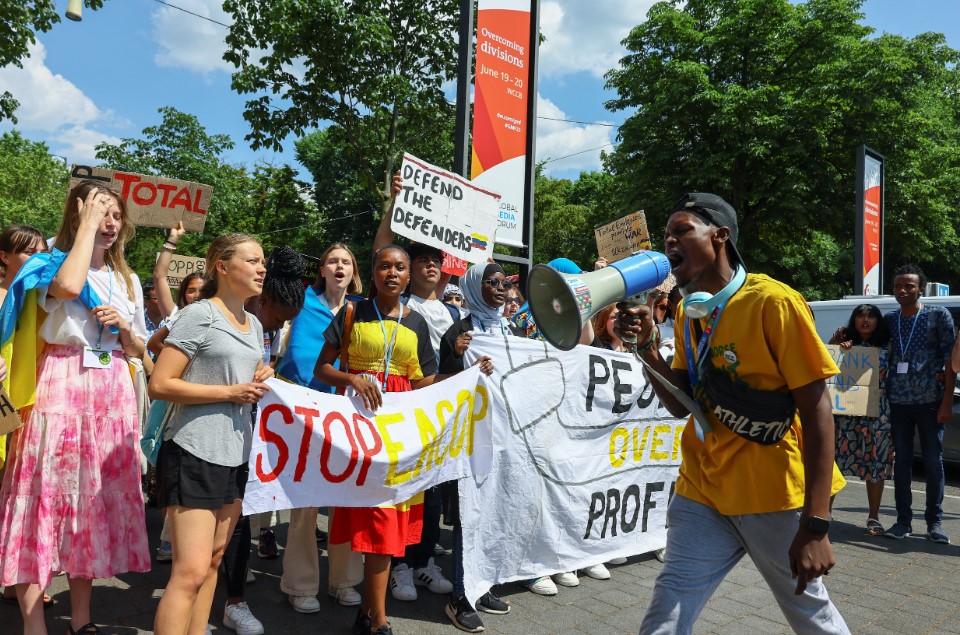 By Basma Eid, Campaign and Membership Director at ESCR-Net
By Basma Eid, Campaign and Membership Director at ESCR-Net
False solutions, dangerous distractions, corporate capture, silencing, and empty pledges – how else can we sum up COP28? With the conclusion of another conference robbing us of our right to a future, it is imperative that we, as feminist from the global south and across diaspora, not only reflect on our participation in co-opted spaces (which seem to only serve the interests of capital), but that we also evaluate our strategies moving forward beyond the confines of a woefully inept system.
From the outset, we had serious questions relating to the legitimacy of a COP being held in the heart of a major oil producing country, overseen by a presidency directly connected to the oil industry. This COP had a record number of fossil fuel lobbyists present and so it is no surprise to see how weak the outcome achieved was – failing to truly take on the phasing out of fossil fuels, failing to achieve commitments to fill the loss and damage fund, failing to reach consensus on much of article 6 – to mention just a few of its disastrous shortcomings.
The UAE is not unique in being a host-country with a disastrous human rights record; it has unjustly imprisoned many who dare to speak out and has effectively eliminated any semblance of civil space. In 2020 the UAE government normalized relations with the Zionist entity and recent reports have linked the state to bankrolling the ongoing violence in Sudan. So as expected, the intense level of suppression and surveillance of civil society at COP did not come as a surprise. Despite the constant attempts to silence and minimize our voices, the diverse movements who descended upon COP28 proved the power of our collectivity. Our people did not back down and we refused to comply with the incessant transgressing on our rights to protest and mobilize. The solidarity shared with our siblings facing oppression could be tangibly felt throughout the venue – from Palestine to Puerto Rico, West Papua to the Congo, we know that there can be no climate justice under war and occupation.
COP28 began with the operationalization of the loss and damage fund, cementing the role of the World Bank in hosting the fund for the next four years. There can be no climate reparations when the institution facilitating the fund is the same institution that has deprived us of social provision, that has forced austerity and extractivism as the only means to “development”, that is guilty of financing violent and murderous land grabs, and whose very existence jeopardizes our fundamental human rights.
A World Bank operated facility is a major setback in the fight for loss and damage as it effectively guarantees further debt-creation for the many states who have been trapped in a cycle of impoverishment due to illegitimate and colonial debts. We know that it is women, in all their diversity, who not only bear the brunt of the climate crisis but who are also disproportionately impacted by debt and care crises. Those who are caring for our territories and defending our waters are the same bodies who care for our collective survival – so when we demand climate justice we are equally demanding our liberation from the shackles of debt. As our sisters and comrades in Latina America demand, “Vivas, libres y desendeudadas nos queremos” ( Alive, Free, and Un-indebted we love each other!)
For those of us from the SWANA region and across the diaspora, we are all too familiar with loss and damage. Our region is one of the most severely impacted by the climate crisis and we experience some of the highest levels of water scarcity, enduring extremely high temperatures and heatwaves, among other adverse climate shocks. This year’s deadly floods in Derna was a wake up call to many who deny the reality of the triple planetary crisis and who question human-induced climate change. Disasters like what happened in Libya but also across the region and globally, will only continue to ravage our homelands as long as the neoliberal development paradigm continues to dominate our social and economic systems. The pennies that have been pledged to the fund will never amount to true justice owed to our communities and there is no fund that will resurrect our loved ones who have been lost or our traditions that have been buried.
The overlapping debt, care and climate crises are felt even worse within contexts of conflict, war, and occupation, with particularly devastating impacts on women, in all their diversities, who suffer from this multidimensional violence. Our region has suffered decade after decade from the disastrous impacts of imperialism and militarism. It is no secret that war and militarism are key drivers of the climate crises and in fact, the US military is one of the world’s largest carbon emitters and the US Department of Defense is the largest institutional consumer of fossil fuels. Research from Dr. Neta Crawford and others at Brown University have found that the United States military has emitted 1.2 billion metric tons of carbon since the start of the so-called “war on terror”.
If we look, for example, at the catastrophic environmental impacts of the illegal US-led invasion and occupation of Iraq, our Iraqi siblings are struggling to survive. We are still witnessings, 20 years later, what many would describe as ecocide.The white phosphorus that was dropped on Fallujah is the same white phosphorus that is being dropped on Gaza and South Lebanon, leaving both the people and the land irreparably destroyed. These are also losses and damages that go unacknowledged, reparations that are owed to our communities for the multiple levels of harm we have suffered.
As feminists, we understand that the fight for climate justice is a fight for our collective future and we will never achieve true climate justice without guaranteeing human rights for all of us. We unequivocally reject climate colonialism which is rooted in the ongoing violent dispossession and extraction of our lands, water, and resources. We do not consent to these ongoing abuses of our lands in the same way that we do not consent to the abuses inflicted on our bodies. We will continue to struggle for justice, carrying on the legacies of our sisters and comrades who paid the ultimate price for defending and caring for our homelands. We raise our voices for our people who have been disappeared and imprisoned and we will keep on fighting for a truly just transition – a transition that moves us away from extractivism and militarism, and transforms our society into one rooted in care and regeneration.
Free the people, free the land.


